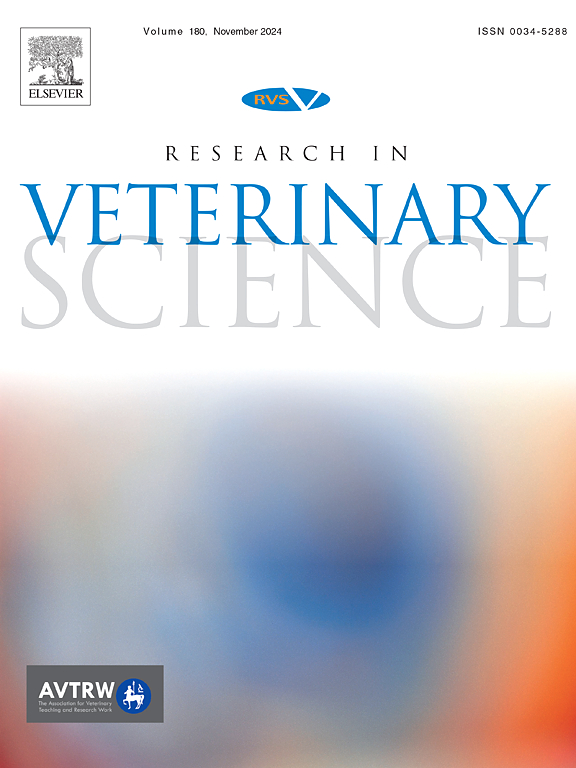益生菌对健康犬抗生素治疗引起的肠道菌群失调的有益作用
IF 2.2
3区 农林科学
Q1 VETERINARY SCIENCES
引用次数: 0
摘要
肠道菌群在维持宿主健康方面起着至关重要的作用。虽然有许多研究探索了抗生素对人类肠道微生物群的影响,但很少有研究调查抗生素如何影响狗的肠道微生物群。本研究研究了抗生素治疗对狗肠道微生物群的影响,并评估了补充益生菌是否可以预防抗生素引起的生态失调。14只接受阉割的健康幼犬被纳入研究。所有的狗在手术后立即接受单次头孢维菌素注射。益生菌组(7只狗)从手术当天开始每天服用益生菌复合物,持续两周,而非益生菌组(7只狗)没有补充。在手术当天和两周后的拆线随访期间收集粪便样本进行微生物组分析。在微生物多样性分析中,添加益生菌组α-多样性显著高于未添加益生菌组(p <;0.05)。β-多样性分析显示,抗生素治疗后,非益生菌组的微生物群落组成存在显著差异(p <;0.05),而益生菌组差异不显著。相对丰度分析显示,抗生素诱导的生态失调标志物梭状芽孢杆菌(clostridiides)在未服用益生菌的狗中显著增加(p <;0.05)。相反,对肠道健康有益的产丁酸菌丁酸球菌(Butyricicoccus)在益生菌组中显著富集(p <;0.05)。这些发现表明,补充益生菌支持抗生素治疗后更健康的肠道微生物群恢复,并强调其增强肠道微生物群恢复和减轻抗生素引起的肠道生态失调的潜力。本文章由计算机程序翻译,如有差异,请以英文原文为准。
Beneficial effects of probiotics on dysbiosis of gut microbiota induced by antibiotic treatment in healthy dogs
The gut microbiota plays a crucial role in maintaining host health. While numerous studies have explored the impact of antibiotics on the gut microbiota in humans, limited research has examined how antibiotics affect the gut microbiome in dogs. This study investigated the effects of antibiotic treatment on the gut microbiota of dogs and assessed whether probiotic supplementation could prevent antibiotic-induced dysbiosis. Fourteen healthy young dogs undergoing castration were included in the study. All dogs received a single injection of cefovecin immediately after surgery. The probiotics group (7 dogs) was given a probiotic complex daily starting on the day of surgery and continuing for two weeks, while the non-probiotics group (7 dogs) received no supplementation. Fecal samples were collected on the day of surgery and two weeks later during the follow-up visit for suture removal for microbiome analysis. In microbial diversity analysis, α-diversity was significantly higher in the probiotic-supplemented group compared to the non-probiotics group (p < 0.05). β-diversity analysis revealed significant differences in microbial community composition in the non-probiotics group after antibiotic treatment (p < 0.05), while no significant differences were observed in the probiotics group. Relative abundance analysis indicated that Clostridioides, a marker of antibiotic-induced dysbiosis, significantly increased in dogs without probiotics after antibiotic treatment (p < 0.05). In contrast, Butyricicoccus, a butyrate-producing bacterium with gut health benefits, was significantly enriched in the probiotics group (p < 0.05). These findings suggest that probiotic supplementation supports healthier gut microbiome recovery following antibiotic treatment and highlights its potential to enhance gut microbiota restoration and mitigate gut dysbiosis caused by antibiotics.
求助全文
通过发布文献求助,成功后即可免费获取论文全文。
去求助
来源期刊

Research in veterinary science
农林科学-兽医学
CiteScore
4.40
自引率
4.20%
发文量
312
审稿时长
75 days
期刊介绍:
Research in Veterinary Science is an International multi-disciplinary journal publishing original articles, reviews and short communications of a high scientific and ethical standard in all aspects of veterinary and biomedical research.
The primary aim of the journal is to inform veterinary and biomedical scientists of significant advances in veterinary and related research through prompt publication and dissemination. Secondly, the journal aims to provide a general multi-disciplinary forum for discussion and debate of news and issues concerning veterinary science. Thirdly, to promote the dissemination of knowledge to a broader range of professions, globally.
High quality papers on all species of animals are considered, particularly those considered to be of high scientific importance and originality, and with interdisciplinary interest. The journal encourages papers providing results that have clear implications for understanding disease pathogenesis and for the development of control measures or treatments, as well as those dealing with a comparative biomedical approach, which represents a substantial improvement to animal and human health.
Studies without a robust scientific hypothesis or that are preliminary, or of weak originality, as well as negative results, are not appropriate for the journal. Furthermore, observational approaches, case studies or field reports lacking an advancement in general knowledge do not fall within the scope of the journal.
 求助内容:
求助内容: 应助结果提醒方式:
应助结果提醒方式:


